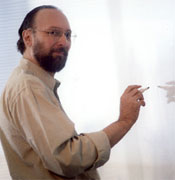 |

Training the Next Generation of Biomedical Scientists
It is axiomatic that basic biomedical research is an engine that drives advances in the prevention and treatment of human disease. Our increasingly detailed knowledge of cell physiology, coupled with new methods of analysis, has placed demand on the scientific community to rapidly translate bench findings to the clinic. Yet the training necessary to master all elements of this most important of endeavors is fragmented, with curricula for the Ph.D. and M.D. degrees being distinctly different.
 The traditional solution to this problem, studying for both degrees, requires considerable personal investment. With our Ph.D. Program in Cancer Biology (CBGP) at the Louis V. Gerstner, Jr. Graduate School of Biomedical Sciences, Memorial Sloan-Kettering Cancer Center (known as Gerstner Sloan-Kettering, or GSK), we are trying to create a new kind of pathway to translational research - one that does not require both M.D. and Ph.D. degrees.
The traditional solution to this problem, studying for both degrees, requires considerable personal investment. With our Ph.D. Program in Cancer Biology (CBGP) at the Louis V. Gerstner, Jr. Graduate School of Biomedical Sciences, Memorial Sloan-Kettering Cancer Center (known as Gerstner Sloan-Kettering, or GSK), we are trying to create a new kind of pathway to translational research - one that does not require both M.D. and Ph.D. degrees.
The CBGP at GSK offers training in the biomedical sciences through the lens of a human disease, cancer. The program is designed to produce Ph.D. graduates who have a solid grounding in basic biomedical science, as well as significantly increased exposure to clinical research. The long-term goal is to train investigators who can serve as intellectual bridges to connect these two biomedical research communities.
To achieve this, we have developed a curriculum that integrates the basic and clinical sciences during the first year of graduate school. The primary didactic experience is the Core Course, which meets daily. During the first year, students also shadow physicians in the clinic to develop an appreciation for the human side of cancer and meet with clinicians of all ranks to begin to develop an appreciation for the challenges faced in developing effective treatments.
The classroom exercises start with genes and proteins and end with clinical issues, and the classes are taught by basic scientists, physician scientists, and clinicians. A typical day includes both a lecture and group discussion of a paper. Many topics lend themselves to the kind of integration that we seek. For example, the treatment of DNA topoisomerases starts with my lecture on the basic biochemistry of the enzymes and the molecular mechanism of topoisomerase inhibitors, such as the anticancer drugs etoposide and topotecan. My colleague Dr. David Spriggs, the head of the Division of Solid Tumor Oncology in the Department of Medicine at Memorial Hospital, then follows with a lecture on the use of anti-topoisomerase drugs in the clinic, providing a gateway to a more general discussion of chemotherapeutic agents. In addition, the students read and discuss a paper from Dr. Leroy Liu's group describing the seminal observation that DNA replication is required for the activity of camptothecin. One important aspect of the group discussion is how this observation should be factored into treatment, weighing both benefit and toxicity.
After choosing a thesis laboratory and completing a thesis proposal, students can continue to learn about clinical research through a clinical mentor who is a member of the attending staff. Selection of clinical mentors is guided by a student's research project. For example, a student studying meiosis might have a clinical mentor who studies and treats patients with germ cell tumors. The clinical mentor serves as a student's conduit to hospital-based academic activities, such as grand rounds, resident's reports, and core lecture series.
The goal of this clinical apprenticeship, which has both formal and tutorial aspects, is to encourage students to develop a clinical perspective on the application of bench work to
the clinic. During this process, we expect our students to gain facility with the clinical lexicon, familiarity with the workings of clinical trials, understanding of the difficulties of proving efficacious treatments, an appreciation of how human physiology can dictate the mode of intervention, and knowledge of the various
mechanisms and technologies that exist for the development of new, innovative treatments.
The CBGP at GSK is in its formative years, so we are still a work in progress. But the remarkably gratifying response from the pool of students applying to graduate school suggests both a need and desire for programs such as ours.
Dr. Kenneth J. Marians
Dean, Louis V. Gerstner Jr.
Graduate School of Biomedical Sciences, Memorial Sloan-Kettering Cancer Center
|